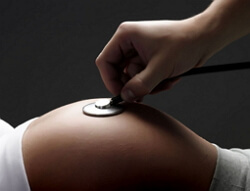Vaginitis during pregnancy

Vaginitis( colpitis) is the inflammatory process in the mucous membrane of the vagina and cervix( vaginal part), which is accompanied by swelling and abundant white or purulent secretions that have an unpleasant smell. Such inflammation can occur as a result of various diseases, including: chlamydia, candidiasis, mycoplasmosis, gonorrhea, genital herpes, trichomoniasis, ureaplasmosis, bacterial vaginosis( in another, gardnerellez) and other infections.
If the vaginitis is not treated, then the inflammatory process can cover the cervical canal, the uterus itself, the appendages and other organs, and this can lead to diseases such as endometritis, erosion of the cervix and infertility.
Vaginitis during pregnancy is very difficult for an observant physician, but an integral part of monitoring a pregnant woman. Regardless of the duration of pregnancy and the presence of inflammatory processes in the history( health history), sixty-five percent of women experience inflammation. If to engage in inadequate treatment during this period, the fetus may develop an intrauterine infection, miscarriage may occur, miscarriage or premature birth may occur.
Causes of
During pregnancy, vaginitis can occur for the following reasons:
At any time in a given period, women experience a state of immunodeficiency, since during this period the immunity experiences a doubled load. Such immunodeficiency manifests itself not only in the form of a viral disease, but sometimes also in the form of nonspecific bacterial vaginitis.
The second reason is not 100% reliability of diagnostics. Neither a bacterioscopic examination of the secret of the vagina, nor its smear, nor the PCR method gives an absolute guarantee that there are no sexual infections in the body of a woman. For example, chlamydia and ureaplasmosis are sometimes in a latent stage and can be detected only with the help of provocative samples. Pregnancy is the provoking factor that detects these infections.
Symptoms of
The symptoms of vaginitis in a pregnant woman are identical to the symptoms of vaginitis in a woman under normal conditions. To determine the method of treatment, you should determine whether it is specific or not.
Treatment of
Treatment of vaginitis in a pregnant woman is a rather difficult task. This is due to the fact that during this period the dosage of antibacterial drugs necessary for cure is impossible, since this will adversely affect the fetus. Local methods of treatment, such as syringing, etc., are generally contraindicated at any time of pregnancy.
Treatment of nonspecific vaginitis
In this case, prescribe candles or creams that contain a large number of lactobacilli, which are representatives of the normal microflora of the vagina. In addition, baths with solutions of calendula or chamomile are shown. The aim of this therapy is to restore the natural, normal microflora in the vagina.
Features of treatment of specific vaginitis
For the treatment of vaginitis of this nature( trichomonads, chlamydia, fungi, ureaplasma, etc.), it is necessary to take into account some features.
First, if during the pregnancy the woman's tests were good and the symptoms of the disease appeared only in the latest studies( with ureaplasma or chlamydia were found), then, as a rule, expective tactics are used. The doctor prescribes strengthening therapy, the treatment is identical to the treatment of nonspecific vaginitis, and there is ongoing monitoring of the tests.
If the causative agent of vaginitis is Trichomonas or Gonococcus, then active therapy is used for therapy. The doctor prescribes antiseptic drugs in the form of candles or creams( such as pimafucin, povidone-iodine, fllosein), baths with plant tinctures that have an antibacterial effect( this is the effect of calendula or chamomile).In rare cases, when the benefits of treatment are greater than the adverse effects on the fetus, antibiotics are prescribed.
Thirdly, treatment of this kind of vaginitis should be carried out in a hospital setting, when constant monitoring of doctors.



